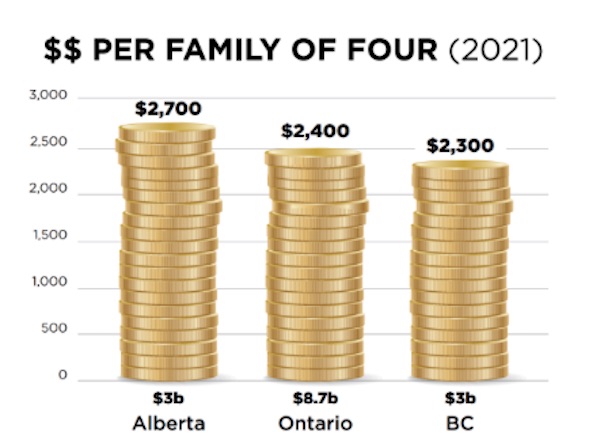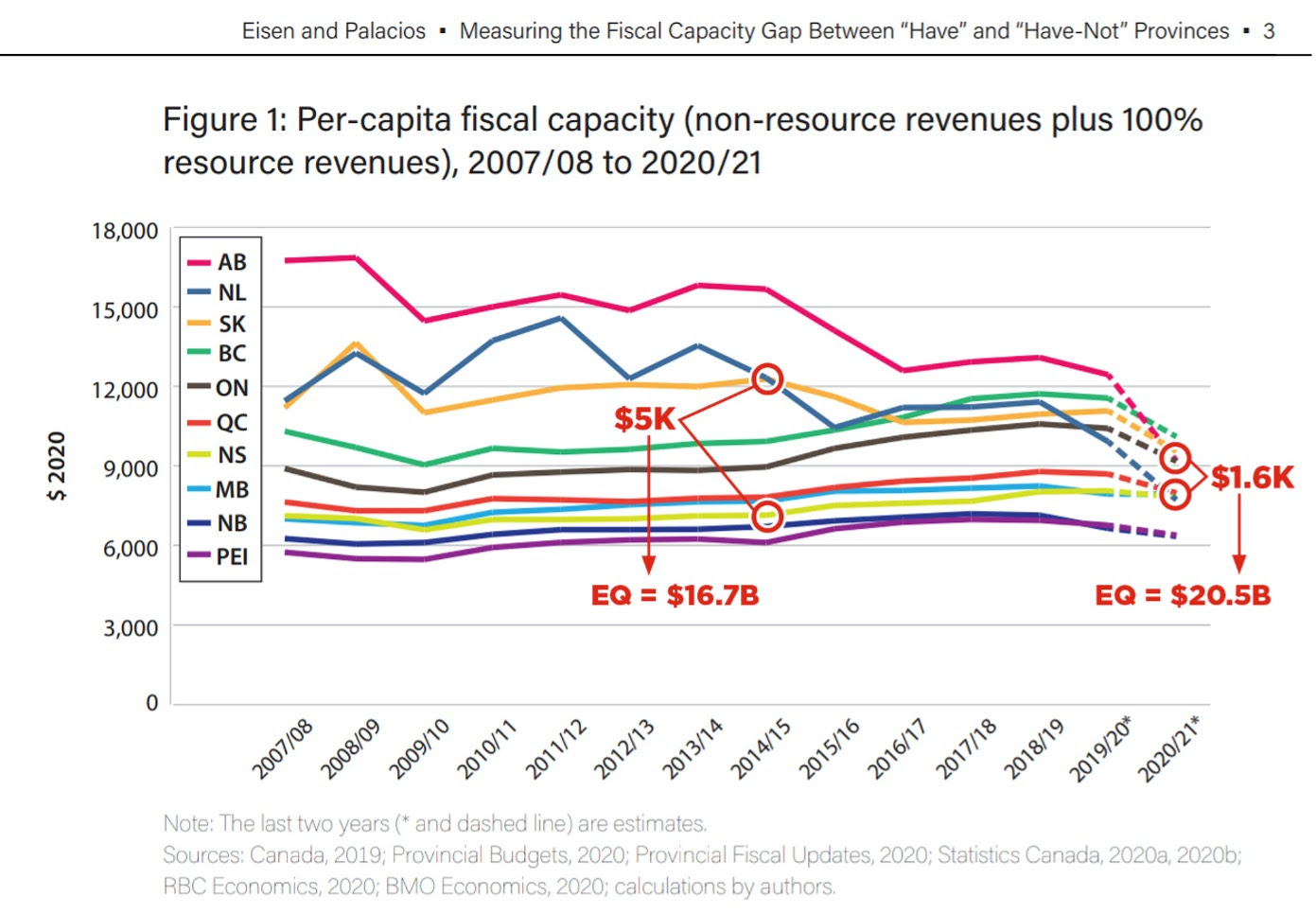Alberta
Equalization payments aren’t just controversial in Alberta anymore! Ontario poll shows overwhelming negative view

News release from Fairness Alberta
POLL: VAST MAJORITY OF ONTARIANS SAY EQUALIZATION PAYMENTS ARE UNFAIR
Fairness Alberta calls for $8 billion rebate for Ontario
Fairness Alberta has released a poll showing 73% of Ontarians believe ever-growing Equalization payments are unfair given the narrowing wealth gap between provinces since 2015.
The poll, from a weighted survey of 1,000 Canadians recently conducted by the Toronto firm One Persuasion Inc. (MoE +/-3.1%), showed a large majority of Ontarians said it is unfair that Equalization payments rose 23% since 2015, making Ontario’s share of funding the program equivalent to roughly $2400 per family of four (see bottom). Opposition to the status quo on Equalization was highest in the 905 region of suburban Toronto.

(To see the full results of the poll click here)
“Ontarians have been funding unfairly high Equalization payments for others while their own provincial government was struggling to pay for services even before COVID-19,” said Fairness Alberta Executive Director Dr. Bill Bewick. “Given the collapse of the wealth gap between provinces, the so-called ‘have’ provinces should get the share of Equalization that came from their taxpayers rebated until we achieve meaningful reforms to federal-provincial funding.”
As Dr. Bewick outlined in the National Post, even a 50% rebate would mean a bump to provincial budgets of $4 billion in Ontario and $1.5 billion being returned to B.C. and Alberta as their provincial responsibilities come under strain.
“The $21 billion-and-growing price tag for Equalization is totally unnecessary and unaffordable given how much more equal provinces have become since 2015,” added Dr. Bewick. “This isn’t just an Alberta problem. Ontario, B.C., Alberta, Saskatchewan, and Newfoundland make up nearly 70% of Canada’s population and it has become obvious that the program is unfair to all of them.”
A recent study by Ben Eisen and Milagros Palacios illustrates the “Great Convergence” in provincial fortunes since the 2015 energy downturn. While the gap between the median ‘have’ and ‘have not’ fell from $5000 per person in 2015 to only $1600 in 2020, Equalization payments grew 23%. With increases tied to national GDP rather than need, a $20.9 billion windfall is going to 5 provinces (with less than 1/3 of the population) in 2021.

About Fairness Alberta:
Fairness Alberta is a grassroots, non-partisan, and non-separatist association of concerned citizens, aiming to increase awareness across the country about Albertans’ disproportionate contributions to Canada, while also providing clear, factual information on unfair federal policies that will further undermine the prosperity of Alberta and other contributing provinces.
Fairness Alberta previously released analysis and recommendations for reforms to Equalization and the Fiscal Stabilization program, with an overview of fiscal federalism as well at www.fairnessalberta.ca.
Previous releases, interviews, columns, and two presentations to the House of Commons Standing Committee on Finance can be found in the NEWS section of our website. For more information on Fairness Alberta, its mandate, and future plans, please visit our website at www.fairnessalberta.ca.
For further information or to arrange interviews, please contact:
Bill Bewick, Ph.D.
Executive Director
Fairness Alberta
Cell: (780) 996-6019
Email: bill.bewick@

*per-province calculations based on provincial contributions to general revenue proportionally applied to the $20.9b spent on Equalization in 2021. Source for per-province shares is this Library of Parliament document: https://lop.parl.ca/sites/
Alberta
Alberta government announces review of Trudeau’s euthanasia regime

From LifeSiteNews
Alberta announced it ‘is reviewing how MAID is regulated to ensure there is a consistent process as well as oversight that protects vulnerable Albertans, specifically those living with disabilities or suffering from mental health challenges.’
The Conservative provincial government of Alberta is pushing back against the Canadian federal government’s continued desire to expand euthanasia in the nation, saying it will launch a review of the legislation and policies surrounding the grim practice, including a period of public engagement.
The United Conservative Party (UCP) government under Premier Danielle Smith in a press release said the province needs to make sure that robust safeguards and procedures are in place to protect vulnerable people from being coerced into getting euthanatized under the MAiD (Medical Assistance in Dying) program.
“Alberta’s government is reviewing how MAID is regulated to ensure there is a consistent process as well as oversight that protects vulnerable Albertans, specifically those living with disabilities or suffering from mental health challenges,” said the government Monday.
The government said a online survey regarding MAiD open to all Albertans who have opinions about the deadly practice will be available until December 20.
“We recognize that medical assistance in dying is a very complex and often personal issue and is an important, sensitive and emotional matter for patients and their families,” said Alberta’s Minister of Justice and Attorney General Mickey Amery.
Amery said it is important to ensure this process has the “necessary supports to protect the most vulnerable.”
The government said that it will also be engaging with academics, medical associations, public bodies, as well as religious organizations and “regulatory bodies, advocacy groups” regarding MAiD
The government said all information gathered through this consultation will “help inform the Alberta government’s planning and policy decision making, including potential legislative changes regarding MAID in Alberta.”
When it comes to MAiD, Prime Minister Justin Trudeau’s Liberal government sought to expand it from the chronically and terminally ill to those suffering solely from mental illness.
However, in February, after pushback from pro-life, medical, and mental health groups as well as most of Canada’s provinces, the federal government delayed the mental illness expansion until 2027.
Alberta’s Minister of Mental Health and Addiction Dan Williams said that the UCP government has been “clear” that it does not “support the provision of medically assisted suicide for vulnerable Albertans facing mental illness as their primary purpose for seeking their own death.”
“Instead, our goal is to build a continuum of care where vulnerable Albertans can live in long-term health and fulfilment. We look forward to the feedback of Albertans as we proceed with this important issue,” he noted.
The Alberta government said that as MAiD is “federally legislated and regulated” it is main job will be to try and make sure that it protects “vulnerable individuals” as much as possible.
Alberta’s Minister of Health Adriana LaGrange reaffirmed that the Alberta government “does not support expanding MAID eligibility to include those facing depression or mental illness and continues to call on the federal government to end this policy altogether.”
The number of Canadians killed by lethal injection under the nation’s MAiD program since 2016 stands at close to 65,000, with an estimated 16,000 deaths in 2023 alone. Many fear that because the official statistics are manipulated the number may be even higher.
To combat Canadians being coerced into MAiD, which LifeSiteNews has covered, the combat pro-life Delta Hospice Society (DHS) is offering a free “Do Not Euthanize Defense Kit” to help vulnerable people “protect themselves” from any healthcare workers who might push euthanasia on the defenseless.
Alberta
Early Success: 33 Nurse Practitioners already working independently across Alberta

Nurse practitioners expand primary care access |
The Alberta government’s Nurse Practitioner Primary Care program is showing early signs of success, with 33 nurse practitioners already practising independently in communities across the province.
Alberta’s government is committed to strengthening Alberta’s primary health care system, recognizing that innovative approaches are essential to improving access. To further this commitment, the Nurse Practitioner Primary Care Program was launched in April, allowing nurse practitioners to practise comprehensive patient care autonomously, either by operating their own practices or working independently within existing primary care settings.
Since being announced, the program has garnered a promising response. A total of 67 applications have been submitted, with 56 approved. Of those, 33 nurse practitioners are now practising autonomously in communities throughout Alberta, including in rural locations such as Beaverlodge, Coaldale, Cold Lake, Consort, Morley, Picture Butte, Three Hills, Two Hills, Vegreville and Vermilion.
“I am thrilled about the interest in this program, as nurse practitioners are a key part of the solution to provide Albertans with greater access to the primary health care services they need.”
To participate in the program, nurse practitioners are required to commit to providing a set number of hours of medically necessary primary care services, maintain a panel size of at least 900 patients, offer after-hours access on weekends, evenings or holidays, and accept walk-in appointments until a panel size reaches 900 patients.
With 33 nurse practitioners practising independently, about 30,000 more Albertans will have access to the primary health care they need. Once the remaining 23 approved applicants begin practising, primary health care access will expand to almost 21,000 more Albertans.
“Enabling nurse practitioners to practise independently is great news for rural Alberta. This is one more way our government is ensuring communities will have access to the care they need, closer to home.”
“Nurse practitioners are highly skilled health care professionals and an invaluable part of our health care system. The Nurse Practitioner Primary Care Program is the right step to ensuring all Albertans can receive care where and when they need it.”
“The NPAA wishes to thank the Alberta government for recognizing the vital role NPs play in the health care system. Nurse practitioners have long advocated to operate their own practices and are ready to meet the growing health care needs of Albertans. This initiative will ensure that more people receive the timely and comprehensive care they deserve.”
The Nurse Practitioner Primary Care program not only expands access to primary care services across the province but also enables nurse practitioners to practise to their full scope, providing another vital access point for Albertans to receive timely, high-quality care when and where they need it most.
Quick facts
- Through the Nurse Practitioner Primary Care Program, nurse practitioners receive about 80 per cent of the compensation that fee-for-service family physicians earn for providing comprehensive primary care.
- Compensation for nurse practitioners is determined based on panel size (the number of patients under their care) and the number of patient care hours provided.
- Nurse practitioners have completed graduate studies and are regulated by the College of Registered Nurses of Alberta.
- For the second consecutive year, a record number of registrants renewed their permits with the College of Registered Nurses of Alberta (CRNA) to continue practising nursing in Alberta.
- There were more than 44,798 registrants and a 15 per cent increase in nurse practitioners.
- Data from the Nurse Practitioner Primary Care Program show:
- Nine applicants plan to work on First Nations reserves or Metis Settlements.
- Parts of the province where nurse practitioners are practising: Calgary (12), Edmonton (five), central (six), north (three) and south (seven).
- Participating nurse practitioners who practise in eligible communities for the Rural, Remote and Northern Program will be provided funding as an incentive to practise in rural or remote areas.
- Participating nurse practitioners are also eligible for the Panel Management Support Program, which helps offset costs for physicians and nurse practitioners to provide comprehensive care as their patient panels grow.
Related information
-

 Brownstone Institute2 days ago
Brownstone Institute2 days agoThe Most Devastating Report So Far
-

 Business2 days ago
Business2 days agoCarbon tax bureaucracy costs taxpayers $800 million
-

 ESG1 day ago
ESG1 day agoCan’t afford Rent? Groceries for your kids? Trudeau says suck it up and pay the tax!
-

 Daily Caller1 day ago
Daily Caller1 day agoLos Angeles Passes ‘Sanctuary City’ Ordinance In Wake Of Trump’s Deportation Plan
-

 COVID-192 days ago
COVID-192 days agoDr. McCullough praises RFK Jr., urges him to pull COVID shots from the market
-

 John Stossel1 day ago
John Stossel1 day agoGreen Energy Needs Minerals, Yet America Blocks New Mines
-

 Alberta1 day ago
Alberta1 day agoProvince considering new Red Deer River reservoir east of Red Deer
-

 MAiD2 days ago
MAiD2 days agoOver 40% of people euthanized in Ontario lived in poorest parts of the province: government data






